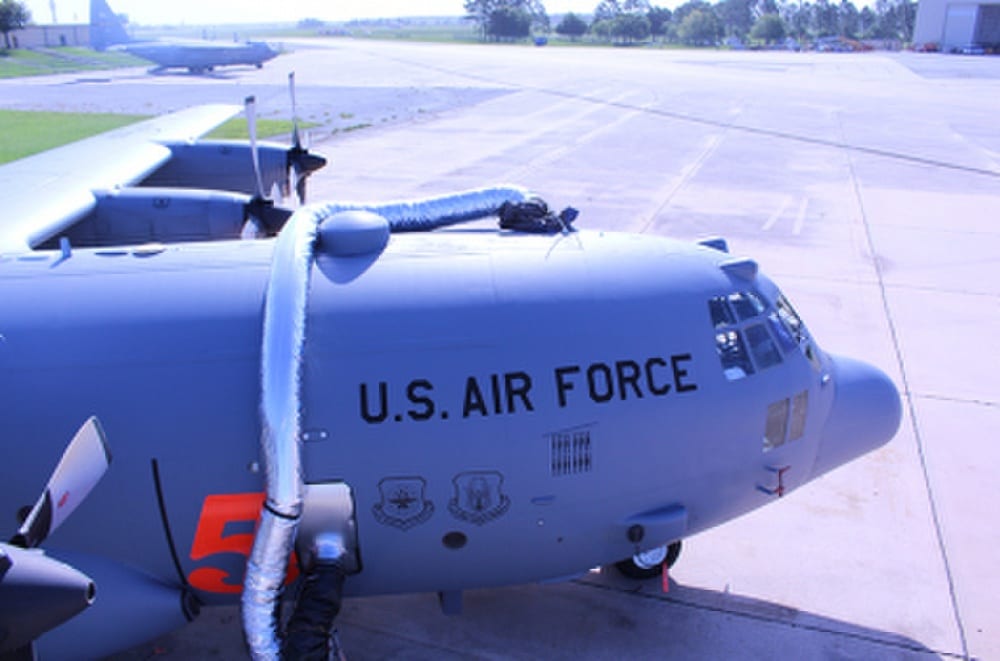Health of air crews is paramount, and ensuring Air Force systems are safe to operate, including aircraft, is crucial.
To support the global fight against COVID-19, the Air Force Research Laboratory quickly stood up an aircraft decontamination team pooling bioenvironmental, aircraft materials and medical experts from across the laboratory who’ve assessed a variety of aircraft decontamination support solutions.
“In 2008, we didn’t have good methods for decontamination, especially for aircraft interiors,’” said Dr. Wendy Goodson, Soft Matter Materials Branch Chief. “With 10 years of research behind us, we are in a better place than we’ve ever been to respond to this crisis, not only from a hardware standpoint, but because we have built in-house AFRL expertise and developed solutions in partnership with the rest of the Air Force.”
Within 10 days, the AFRL team released a document to government agencies and their contractors providing information on aircraft materials-compatible decontamination methods for emerging diseases, specifically COVID-19, caused by the novel coronavirus. It also covers approved aircraft decontamination guidance on methods that have been identified for a range of cases, not specific to aircraft, by the United States Centers for Disease Control and Prevention.
The information is based on existing Air Force technical orders, literature and the experience from various AFRL subject matter experts. It has become the basis for rapid decisions from the Air Force Life Cycle Management Center to Logistics Centers and operational units across the service.
AFRL is also participating in a Joint Urgent Operational Need team that provides materials, medical and bioenvironmental support, and engages various SMEs to deliver recommendations on decontamination methods. The JUON initiated from United States Transportation Command through Air Mobility Command. The team working this response is the COVID Rapid Action Decontamination Team consisting of: AFLCMC, AMC and AFRL experts.
High interest methods include biothermal decontamination, various disinfectants and ultraviolet light. This group is also streamlining questions and answers from the Air Force community, to ensure consistent answers and vetting from vendors.
This is where AFRL is applying their understanding of biological materials and processes to accelerate the evaluation of the Joint Biological Agent Decontamination System against novel coronavirus.
JBADS is an interior biological agent decontamination capability for aircraft, vehicles and equipment. It was developed under AFRL leadership to rapidly decontaminate aircraft that may harbor hazardous microbes, and has been demonstrated effective against multiple agents while being safe, environmentally friendly and effective.
In partnership with Battelle, the AFRL effort will test decontamination conditions required for full effectiveness against multiple organisms including the novel coronavirus, possibly using only heat and humidity parameters.
With a small, low-cost, logistic footprint, the goal for JBADs is to provide the ability to ensure complete decontamination of an entire aircraft in less than two hours. This contrasts current approaches that spray solutions onto surfaces, or direct-line of sight concepts. Mold has proven to be decontaminated in eight hours.
“The AFRL team is pulling together to determine the next steps for applying JBADS,” said William Greer, Senior Research Analyst in the Airman Systems Directorate, part of AFRL’s 711HPW.
“During this pandemic, it is crucial that the aircraft are decontaminated using compatible methods,” said Rachel Krabacher, team coordinator from the Materials and Manufacturing Directorate. “Eliminating COVID-19 from the surface of the aircraft is incredibly important, but not all methods are compatible with military aircraft materials. When the decontamination procedure is complete, we must have confidence that the aircraft and its materials can still perform.”
Possessing the ability to decontaminate aircraft effectively and quickly for patient transfer missions, increase safety for maintenance personnel and provide the warfighter confidence in a safer working environment are all tasks that AFRL continuously strives to improve.
“In this case not only have we tapped into pockets of expertise across AFRL, but we have reached through to our sister services to share data, ideas and expertise,” said Caitlin Bojanowski, Biofilms and Biocorrosion Research Group Leader.
Bojanowski’s work has enabled her to share a wealth of knowledge as well as a transition of basic research principles to the COVID-19 response effort. This will prove especially beneficial as she is planning to test efficacy of decontamination methods in question.
Effective decontamination methods ensure that warfighters are working in a safer environment, which is crucial during this pandemic. Selecting methods that prevent potential corrosion, degradation and other systems failures down the road saves lives, ensures mission readiness, fleet availability, and saves the Air Force time and money.



